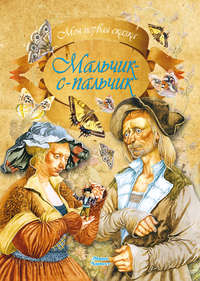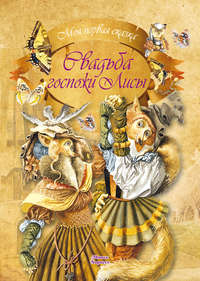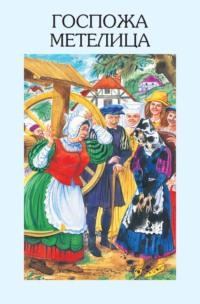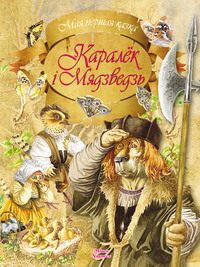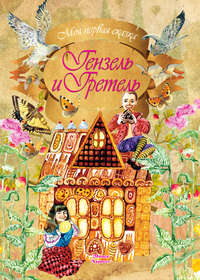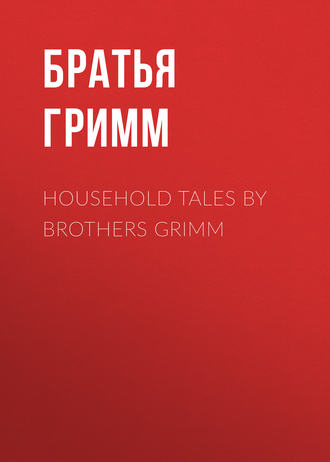 полная версия
полная версияHousehold Tales by Brothers Grimm
Brother Lustig travelled about with his money, and squandered and wasted what he had as before. When at last he had no more than four kreuzers, he passed by an inn and thought, "The money must go," and ordered three kreuzers' worth of wine and one kreuzer's worth of bread for himself. As he was sitting there drinking, the smell of roast goose made its way to his nose. Brother Lustig looked about and peeped, and saw that the host had two geese standing in the oven. Then he remembered that his comrade had said that whatsoever he wished to have in his knapsack should be there, so he said, "Oh, ho! I must try that with the geese." So he went out, and when he was outside the door, he said, "I wish those two roasted geese out of the oven and in my knapsack," and when he had said that, he unbuckled it and looked in, and there they were inside it. "Ah, that's right!" said he, "now I am a made man!" and went away to a meadow and took out the roast meat. When he was in the midst of his meal, two journeymen came up and looked at the second goose, which was not yet touched, with hungry eyes. Brother Lustig thought to himself, "One is enough for me," and called the two men up and said, "Take the goose, and eat it to my health." They thanked him, and went with it to the inn, ordered themselves a half bottle of wine and a loaf, took out the goose which had been given them, and began to eat. The hostess saw them and said to her husband, "Those two are eating a goose; just look and see if it is not one of ours, out of the oven." The landlord ran thither, and behold the oven was empty! "What!" cried he, "you thievish crew, you want to eat goose as cheap as that? Pay for it this moment; or I will wash you well with green hazel-sap." The two said, "We are no thieves, a discharged soldier gave us the goose, outside there in the meadow." "You shall not throw dust in my eyes that way! the soldier was here but he went out by the door, like an honest fellow. I looked after him myself; you are the thieves and shall pay!" But as they could not pay, he took a stick, and cudgeled them out of the house.
Brother Lustig went his way and came to a place where there was a magnificent castle, and not far from it a wretched inn. He went to the inn and asked for a night's lodging, but the landlord turned him away, and said, "There is no more room here, the house is full of noble guests." "It surprises me that they should come to you and not go to that splendid castle," said Brother Lustig. "Ah, indeed," replied the host, "but it is no slight matter to sleep there for a night; no one who has tried it so far, has ever come out of it alive."
"If others have tried it," said Brother Lustig, "I will try it too."
"Leave it alone," said the host, "it will cost you your neck." "It won't kill me at once," said Brother Lustig, "just give me the key, and some good food and wine." So the host gave him the key, and food and wine, and with this Brother Lustig went into the castle, enjoyed his supper, and at length, as he was sleepy, he lay down on the ground, for there was no bed. He soon fell asleep, but during the night was disturbed by a great noise, and when he awoke, he saw nine ugly devils in the room, who had made a circle, and were dancing around him. Brother Lustig said, "Well, dance as long as you like, but none of you must come too close." But the devils pressed continually nearer to him, and almost stepped on his face with their hideous feet. "Stop, you devils' ghosts," said he, but they behaved still worse. Then Brother Lustig grew angry, and cried, "Hola! but I will soon make it quiet," and got the leg of a chair and struck out into the midst of them with it. But nine devils against one soldier were still too many, and when he struck those in front of him, the others seized him behind by the hair, and tore it unmercifully. "Devils' crew," cried he, "it is getting too bad, but wait. Into my knapsack, all nine of you!" In an instant they were in it, and then he buckled it up and threw it into a corner. After this all was suddenly quiet, and Brother Lustig lay down again, and slept till it was bright day. Then came the inn-keeper, and the nobleman to whom the castle belonged, to see how he had fared; but when they perceived that he was merry and well they were astonished, and asked, "Have the spirits done you no harm, then?" "The reason why they have not," answered Brother Lustig, "is because I have got the whole nine of them in my knapsack! You may once more inhabit your castle quite tranquilly, none of them will ever haunt it again." The nobleman thanked him, made him rich presents, and begged him to remain in his service, and he would provide for him as long as he lived. "No," replied Brother Lustig, "I am used to wandering about, I will travel farther." Then he went away, and entered into a smithy, laid the knapsack, which contained the nine devils on the anvil, and asked the smith and his apprentices to strike it. So they smote with their great hammers with all their strength, and the devils uttered howls which were quite pitiable. When he opened the knapsack after this, eight of them were dead, but one which had been lying in a fold of it, was still alive, slipped out, and went back again to hell. Thereupon Brother Lustig travelled a long time about the world, and those who know them can tell many a story about him, but at last he grew old, and thought of his end, so he went to a hermit who was known to be a pious man, and said to him, "I am tired of wandering about, and want now to behave in such a manner that I shall enter into the kingdom of Heaven." The hermit replied, "There are two roads, one is broad and pleasant, and leads to hell, the other is narrow and rough, and leads to heaven." "I should be a fool," thought Brother Lustig, "if I were to take the narrow, rough road." So he set out and took the broad and pleasant road, and at length came to a great black door, which was the door of Hell. Brother Lustig knocked, and the door-keeper peeped out to see who was there. But when he saw Brother Lustig, he was terrified, for he was the very same ninth devil who had been shut up in the knapsack, and had escaped from it with a black eye. So he pushed the bolt in again as quickly as he could, ran to the devil's lieutenant, and said, "There is a fellow outside with a knapsack, who wants to come in, but as you value your lives don't allow him to enter, or he will wish the whole of hell into his knapsack. He once gave me a frightful hammering when I was inside it." So they called out to Brother Lustig that he was to go away again, for he should not get in there! "If they won't have me here," thought he, "I will see if I can find a place for myself in heaven, for I must be somewhere." So he turned about and went onwards until he came to the door of Heaven, where he knocked. St. Peter was sitting hard by as door-keeper. Brother Lustig recognised him at once, and thought, "Here I find an old friend, I shall get on better." But St. Peter said, "I really believe that thou wantest to come into Heaven." "Let me in, brother; I must get in somewhere; if they would have taken me into Hell, I should not have come here." "No," said St. Peter, "thou shalt not enter." "Then if thou wilt not let me in, take thy knapsack back, for I will have nothing at all from thee." "Give it here, then," said St. Peter. Then Brother Lustig gave him the knapsack into Heaven through the bars, and St. Peter took it, and hung it beside his seat. Then said Brother Lustig, "And now I wish myself inside my knapsack," and in a second he was in it, and in Heaven, and St. Peter was forced to let him stay there.
82 Gambling Hansel
Once upon a time there was a man who did nothing but gamble, and for that reason people never called him anything but Gambling Hansel, and as he never ceased to gamble, he played away his house and all that he had. Now the very day before his creditors were to take his house from him, came the Lord and St. Peter, and asked him to give them shelter for the night. Then Gambling Hansel said, "For my part, you may stay the night, but I cannot give you a bed or anything to eat." So the Lord said he was just to take them in, and they themselves would buy something to eat, to which Gambling Hansel made no objection. Thereupon St. Peter gave him three groschen, and said he was to go to the baker's and fetch some bread. So Gambling Hansel went, but when he reached the house where the other gambling vagabonds were gathered together, they, although they had won all that he had, greeted him clamorously, and said, "Hansel, do come in." "Oh," said he, "do you want to win the three groschen too?" On this they would not let him go. So he went in, and played away the three groschen also. Meanwhile St. Peter and the Lord were waiting, and as he was so long in coming, they set out to meet him. When Gambling Hansel came, however, he pretended that the money had fallen into the gutter, and kept raking about in it all the while to find it, but our Lord already knew that he had lost it in play. St. Peter again gave him three groschen, and now he did not allow himself to be led away once more, but fetched them the loaf. Our Lord then inquired if he had no wine, and he said, "Alack, sir, the casks are all empty!" But the Lord said he was to go down into the cellar, for the best wine was still there. For a long time he would not believe this, but at length he said, "Well, I will go down, but I know that there is none there." When he turned the tap, however, lo and behold, the best of wine ran out! So he took it to them, and the two passed the night there. Early next day our Lord told Gambling Hansel that he might beg three favours. The Lord expected that he would ask to go to Heaven; but Gambling Hansel asked for a pack of cards with which he could win everything, for dice with which he would win everything, and for a tree whereon every kind of fruit would grow, and from which no one who had climbed up, could descend until he bade him do so. The Lord gave him all that he had asked, and departed with St. Peter.
And now Gambling Hansel at once set about gambling in real earnest, and before long he had gained half the world. Upon this St. Peter said to the Lord, "Lord, this thing must not go on, he will win, and thou lose, the whole world. We must send Death to him." When Death appeared, Gambling Hansel had just seated himself at the gaming-table, and Death said, "Hansel, come out a while." But Gambling Hansel said, "Just wait a little until the game is done, and in the meantime get up into that tree out there, and gather a little fruit that we may have something to munch on our way." Thereupon Death climbed up, but when he wanted to come down again, he could not, and Gambling Hansel left him up there for seven years, during which time no one died.
So St. Peter said to the Lord, "Lord, this thing must not go on. People no longer die; we must go ourselves." And they went themselves, and the Lord commanded Hansel to let Death come down. So Hansel went at once to Death and said to him, "Come down," and Death took him directly and put an end to him. They went away together and came to the next world, and then Gambling Hansel made straight for the door of Heaven, and knocked at it. "Who is there?" "Gambling Hansel." "Ah, we will have nothing to do with him! Begone!" So he went to the door of Purgatory, and knocked once more. "Who is there?" "Gambling Hansel." "Ah, there is quite enough weeping and wailing here without him. We do not want to gamble, just go away again." Then he went to the door of Hell, and there they let him in. There was, however, no one at home but old Lucifer and the crooked devils who had just been doing their evil work in the world. And no sooner was Hansel there than he sat down to gamble again. Lucifer, however, had nothing to lose, but his mis-shapen devils, and Gambling Hansel won them from him, as with his cards he could not fail to do. And now he was off again with his crooked devils, and they went to Hohenfuert and pulled up a hop-pole, and with it went to Heaven and began to thrust the pole against it, and Heaven began to crack. So again St. Peter said, "Lord, this thing cannot go on, we must let him in, or he will throw us down from Heaven." And they let him in. But Gambling Hansel instantly began to play again, and there was such a noise and confusion that there was no hearing what they themselves were saying. Therefore St. Peter once more said, "Lord, this cannot go on, we must throw him down, or he will make all Heaven rebellious." So they went to him at once, and threw him down, and his soul broke into fragments, and went into the gambling vagabonds who are living this very day.
83 Hans in Luck
Hans had served his master for seven years, so he said to him, "Master, my time is up; now I should be glad to go back home to my mother; give me my wages." The master answered, "You have served me faithfully and honestly; as the service was so shall the reward be;" and he gave Hans a piece of gold as big as his head. Hans pulled his handkerchief out of his pocket, wrapped up the lump in it, put it on his shoulder, and set out on the way home.
As he went on, always putting one foot before the other, he saw a horseman trotting quickly and merrily by on a lively horse. "Ah!" said Hans quite loud, "what a fine thing it is to ride! There you sit as on a chair; you stumble over no stones, you save your shoes, and get on, you don't know how."
The rider, who had heard him, stopped and called out, "Hollo! Hans, why do you go on foot, then?"
"I must," answered he, "for I have this lump to carry home; it is true that it is gold, but I cannot hold my head straight for it, and it hurts my shoulder."
"I will tell you what," said the rider, "we will exchange: I will give you my horse, and you can give me your lump."
"With all my heart," said Hans, "but I can tell you, you will have to crawl along with it."
The rider got down, took the gold, and helped Hans up; then gave him the bridle tight in his hands and said, "If you want to go at a really good pace, you must click your tongue and call out, "Jup! Jup!"
Hans was heartily delighted as he sat upon the horse and rode away so bold and free. After a little while he thought that it ought to go faster, and he began to click with his tongue and call out, "Jup! Jup!" The horse put himself into a sharp trot, and before Hans knew where he was, he was thrown off and lying in a ditch which separated the field from the highway. The horse would have gone off too if it had not been stopped by a countryman, who was coming along the road and driving a cow before him.
Hans got his limbs together and stood up on his legs again, but he was vexed, and said to the countryman, "It is a poor joke, this riding, especially when one gets hold of a mare like this, that kicks and throws one off, so that one has a chance of breaking one's neck. Never again will I mount it. Now I like your cow, for one can walk quietly behind her, and have, over and above, one's milk, butter and cheese every day without fail. What would I not give to have such a cow." "Well," said the countryman, "if it would give you so much pleasure, I do not mind giving the cow for the horse." Hans agreed with the greatest delight; the countryman jumped upon the horse, and rode quickly away.
Hans drove his cow quietly before him, and thought over his lucky bargain. "If only I have a morsel of bread – and that can hardly fail me – I can eat butter and cheese with it as often as I like; if I am thirsty, I can milk my cow and drink the milk. Good heart, what more can I want?"
When he came to an inn he made a halt, and in his great content ate up what he had with him – his dinner and supper – and all he had, and with his last few farthings had half a glass of beer. Then he drove his cow onwards along the road to his mother's village.
As it drew nearer mid-day, the heat was more oppressive, and Hans found himself upon a moor which it took about an hour to cross. He felt it very hot and his tongue clave to the roof of his mouth with thirst. "I can find a cure for this," thought Hans; "I will milk the cow now and refresh myself with the milk." He tied her to a withered tree, and as he had no pail he put his leather cap underneath; but try as he would, not a drop of milk came. And as he set himself to work in a clumsy way, the impatient beast at last gave him such a blow on his head with its hind foot, that he fell on the ground, and for a long time could not think where he was.
By good fortune a butcher just then came along the road with a wheel-barrow, in which lay a young pig. "What sort of a trick is this?" cried he, and helped the good Hans up. Hans told him what had happened. The butcher gave him his flask and said, "Take a drink and refresh yourself. The cow will certainly give no milk, it is an old beast; at the best it is only fit for the plough, or for the butcher." "Well, well," said Hans, as he stroked his hair down on his head, "who would have thought it? Certainly it is a fine thing when one can kill a beast like that at home; what meat one has! But I do not care much for beef, it is not juicy enough for me. A young pig like that now is the thing to have, it tastes quite different; and then there are the sausages!"
"Hark ye, Hans," said the butcher, "out of love for you I will exchange, and will let you have the pig for the cow." "Heaven repay you for your kindness!" said Hans as he gave up the cow, whilst the pig was unbound from the barrow, and the cord by which it was tied was put in his hand.
Hans went on, and thought to himself how everything was going just as he wished; if he did meet with any vexation it was immediately set right. Presently there joined him a lad who was carrying a fine white goose under his arm. They said good morning to each other, and Hans began to tell of his good luck, and how he had always made such good bargains. The boy told him that he was taking the goose to a christening-feast. "Just lift her," added he, and laid hold of her by the wings; "how heavy she is – she has been fattened up for the last eight weeks. Whoever has a bit of her when she is roasted will have to wipe the fat from both sides of his mouth." "Yes," said Hans, as he weighed her in one hand, "she is a good weight, but my pig is no bad one."
Meanwhile the lad looked suspiciously from one side to the other, and shook his head. "Look here," he said at length, "it may not be all right with your pig. In the village through which I passed, the Mayor himself had just had one stolen out of its sty. I fear – I fear that you have got hold of it there. They have sent out some people and it would be a bad business if they caught you with the pig; at the very least, you would be shut up in the dark hole."
The good Hans was terrified. "Goodness!" he said, "help me out of this fix; you know more about this place than I do, take my pig and leave me your goose." "I shall risk something at that game," answered the lad, "but I will not be the cause of your getting into trouble." So he took the cord in his hand, and drove away the pig quickly along a by-path.
The good Hans, free from care, went homewards with the goose under his arm. "When I think over it properly," said he to himself, "I have even gained by the exchange; first there is the good roast-meat, then the quantity of fat which will drip from it, and which will give me dripping for my bread for a quarter of a year, and lastly the beautiful white feathers; I will have my pillow stuffed with them, and then indeed I shall go to sleep without rocking. How glad my mother will be!"
As he was going through the last village, there stood a scissors-grinder with his barrow; as his wheel whirred he sang —
"I sharpen scissors and quickly grind, My coat blows out in the wind behind."Hans stood still and looked at him; at last he spoke to him and said, "All's well with you, as you are so merry with your grinding." "Yes," answered the scissors-grinder, "the trade has a golden foundation. A real grinder is a man who as often as he puts his hand into his pocket finds gold in it. But where did you buy that fine goose?"
"I did not buy it, but exchanged my pig for it."
"And the pig?"
"That I got for a cow."
"And the cow?"
"I took that instead of a horse."
"And the horse?"
"For that I gave a lump of gold as big as my head."
"And the gold?"
"Well, that was my wages for seven years' service."
"You have known how to look after yourself each time," said the grinder. "If you can only get on so far as to hear the money jingle in your pocket whenever you stand up, you will have made your fortune."
"How shall I manage that?" said Hans. "You must be a grinder, as I am; nothing particular is wanted for it but a grindstone, the rest finds itself. I have one here; it is certainly a little worn, but you need not give me anything for it but your goose; will you do it?"
"How can you ask?" answered Hans. "I shall be the luckiest fellow on earth; if I have money whenever I put my hand in my pocket, what need I trouble about any longer?" and he handed him the goose and received the grindstone in exchange. "Now," said the grinder, as he took up an ordinary heavy stone that lay by him, "here is a strong stone for you into the bargain; you can hammer well upon it, and straighten your old nails. Take it with you and keep it carefully."
Hans loaded himself with the stones, and went on with a contented heart; his eyes shone with joy. "I must have been born with a caul," he cried; "everything I want happens to me just as if I were a Sunday-child."
Meanwhile, as he had been on his legs since daybreak, he began to feel tired. Hunger also tormented him, for in his joy at the bargain by which he got the cow he had eaten up all his store of food at once. At last he could only go on with great trouble, and was forced to stop every minute; the stones, too, weighed him down dreadfully. Then he could not help thinking how nice it would be if he had not to carry them just then.
He crept like a snail to a well in a field, and there he thought that he would rest and refresh himself with a cool draught of water, but in order that he might not injure the stones in sitting down, he laid them carefully by his side on the edge of the well. Then he sat down on it, and was to stoop and drink, when he made a slip, pushed against the stones, and both of them fell into the water. When Hans saw them with his own eyes sinking to the bottom, he jumped for joy, and then knelt down, and with tears in his eyes thanked God for having shown him this favour also, and delivered him in so good a way, and without his having any need to reproach himself, from those heavy stones which had been the only things that troubled him.
"There is no man under the sun so fortunate as I," he cried out. With a light heart and free from every burden he now ran on until he was with his mother at home.
84 Hans Married
There was once upon a time a young peasant named Hans, whose uncle wanted to find him a rich wife. He therefore seated Hans behind the stove, and had it made very hot. Then he fetched a pot of milk and plenty of white bread, gave him a bright newly-coined farthing in his hand, and said, "Hans, hold that farthing fast, crumble the white bread into the milk, and stay where you are, and do not stir from that spot till I come back." "Yes," said Hans, "I will do all that." Then the wooer put on a pair of old patched trousers, went to a rich peasant's daughter in the next village, and said, "Won't you marry my nephew Hans – you will get an honest and sensible man who will suit you?" The covetous father asked, "How is it with regard to his means? Has he bread to break?" "Dear friend," replied the wooer, "my young nephew has a snug berth, a nice bit of money in hand, and plenty of bread to break, besides he has quite as many patches as I have," (and as he spoke, he slapped the patches on his trousers, but in that district small pieces of land were called patches also.) "If you will give yourself the trouble to go home with me, you shall see at once that all is as I have said." Then the miser did not want to lose this good opportunity, and said, "If that is the case, I have nothing further to say against the marriage."
So the wedding was celebrated on the appointed day, and when the young wife went out of doors to see the bridegroom's property, Hans took off his Sunday coat and put on his patched smock-frock and said, "I might spoil my good coat." Then together they went out and wherever a boundary line came in sight, or fields and meadows were divided from each other, Hans pointed with his finger and then slapped either a large or a small patch on his smock-frock, and said, "That patch is mine, and that too, my dearest, just look at it," meaning thereby that his wife should not stare at the broad land, but look at his garment, which was his own.




